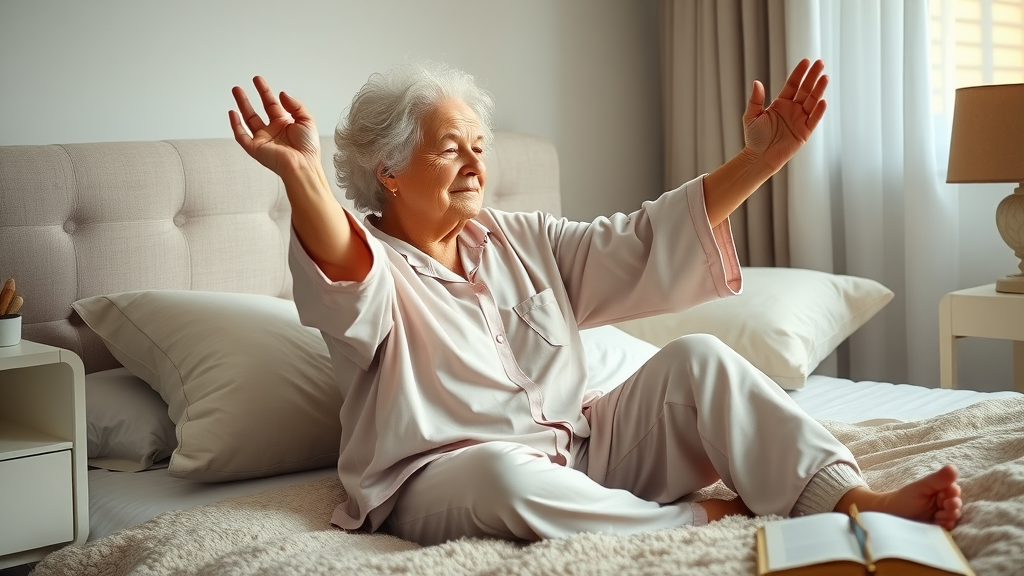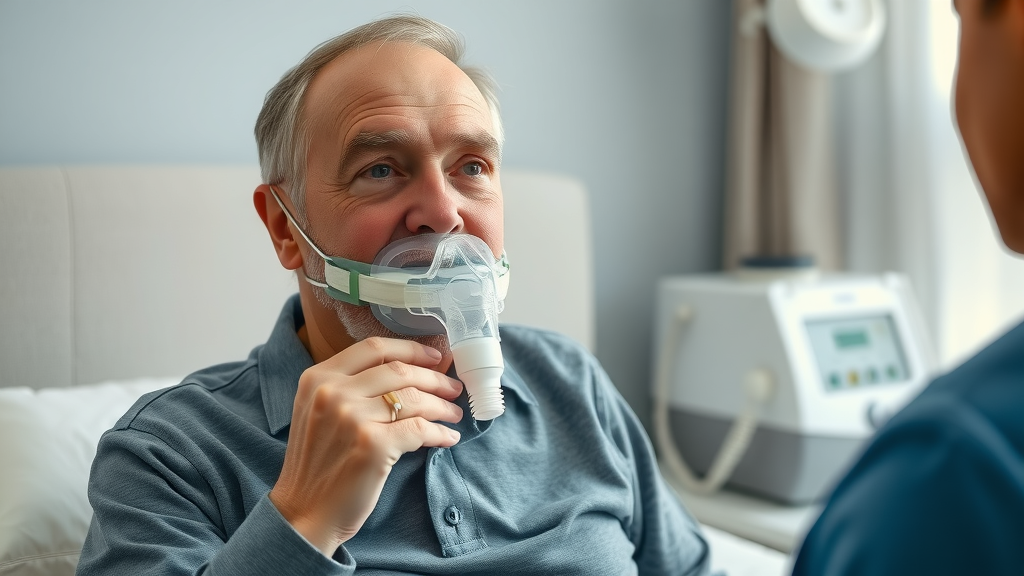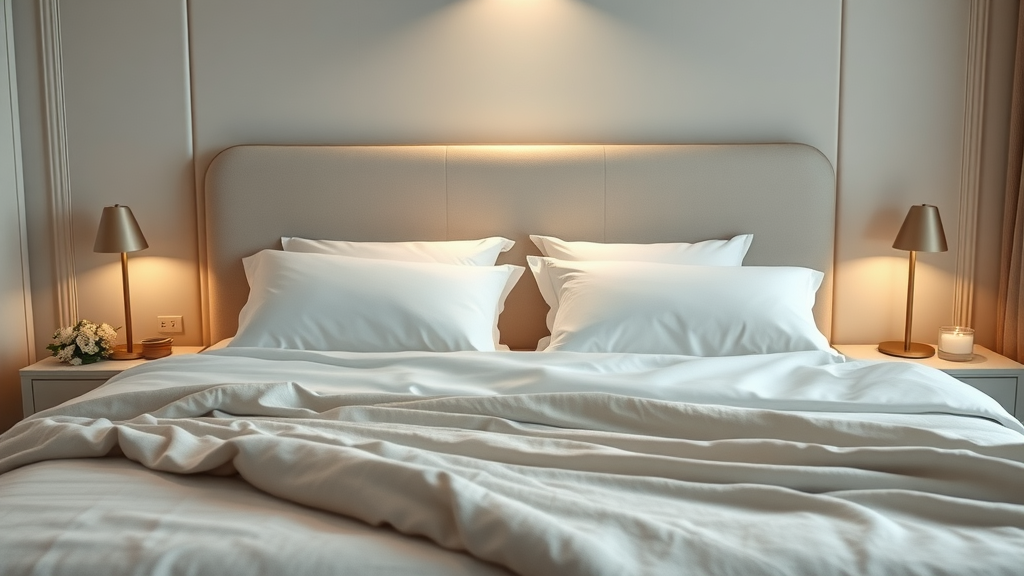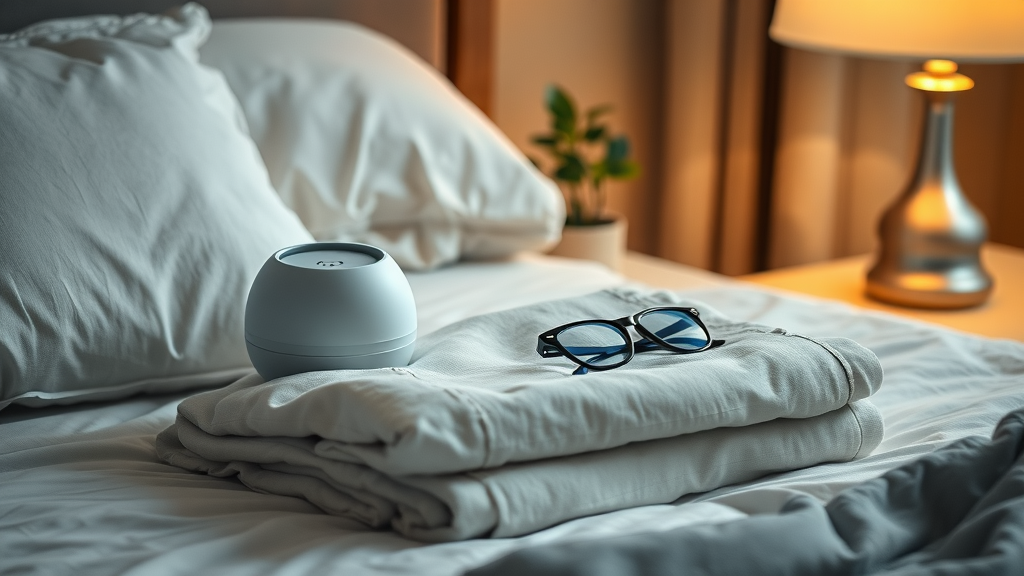Did you know more than half of older adults regularly struggle to fall or stay asleep at night? Sleep issues are far more than a nighttime inconvenience—they significantly increase the risk of falls, chronic illness, and memory problems in seniors. But here’s the good news: with focused strategies for improving senior sleep quality, even longtime sleep problems can be addressed in just a few days. This guide reveals which changes offer the biggest impact for older adults and how to put them into action tonight for a truly good night’s sleep.
Why Fast-Acting Strategies for Improving Senior Sleep Quality Matter for Older Adults
- Did you know that more than 50% of older adults suffer from sleep problems, including sleep disorders and poor sleep quality? Overlooked sleep issues can lead to heightened risks of chronic diseases, depression, and reduced overall quality of life. Immediate improvements are crucial for sustained well-being.

What You'll Gain: Effective Strategies for Improving Senior Sleep Quality
- Understand the most common sleep disorders affecting seniors
- Learn research-backed approaches to improve sleep
- Discover actionable routines for better sleep habits
- Apply expert advice for managing sleep apnea, insomnia, and circadian rhythm shifts
Understanding Sleep Problems in Older Adults: The Foundation of Strategies for Improving Senior Sleep Quality
Common Sleep Issues and Sleep Disorders in Seniors
Aging brings unique sleep challenges for older adults—most commonly, insomnia, sleep apnea, restless legs syndrome , and circadian rhythm disturbances . Sleep apnea, characterized by brief breathing interruptions, is particularly common. Insomnia is persistent trouble falling asleep or staying asleep, affecting energy, mood, and health. Restless legs syndrome involves an overwhelming urge to move the legs, particularly at night, disrupting continuous sleep. Circadian rhythm changes can further make it tricky to both fall asleep early and wake feeling rested, even after a full night in bed.
- Sleep apnea
- Insomnia
- Restless legs syndrome
- Circadian rhythm disturbances

"Sleep issues are among the top reported health concerns for older adults, impacting not just energy, but mood and longevity." – National Sleep Foundation
As people age, changes in sleep patterns become common. However, when these shifts lead to regular sleep deprivation, older adults face an increased risk for chronic health problems, depression, and diminished overall well-being. Recognizing and addressing these problems early allows for rapid improvements, helping seniors regain good sleep quality and enjoy healthier, more vibrant days.
The Impact of Poor Sleep on Older Adults and Why Strategies for Improving Senior Sleep Quality Are Essential
- Increased fall risk
- Cognitive decline
- Chronic pain
- Weaker immune response
Poor sleep is not just an inconvenience—it can be life-changing for seniors. Older adults struggling with sleep deprivation often encounter difficulty with memory, communication, and decision-making. The risk of falls also rises significantly, as exhaustion affects physical coordination and alertness. Chronic sleep issues can worsen pain and slow healing, leading to fewer good days and more frequent medical visits.
In contrast, good sleep strengthens the immune system, boosts mood , and helps maintain independence. By acting quickly with effective strategies for improving senior sleep quality, the negative spiral of sleep deterioration can be halted, and meaningful, long-term results achieved.
| Good Sleep | Poor Sleep |
|---|---|
| Sharper memory and focus | Increased risk of falls and cognitive decline |
| Stronger immune system | Weaker immune response |
| Elevated mood and energy | Frequent fatigue and irritability |
| Reduced chronic pain | Chronic pain worsens |
| Lower risk of depression | Higher risk of depression |
Immediate steps to improve sleep can change the course of health and happiness for older people, making sleep a priority in any wellness routine.
Top Strategies for Improving Senior Sleep Quality That Work Fast
Routine Sleep Habits: How Good Sleep Hygiene Supports Better Results
- Stick to a regular sleep schedule
- Create a calming bedtime routine
- Optimize bedroom temperature and darkness
Good sleep habits—collectively known as sleep hygiene —are at the core of fast-acting strategies for improving senior sleep quality. Older adults should aim to go to bed and wake up at the same times every day, even on weekends. This maintains a healthy circadian rhythm and signals the body when it’s time to sleep at night and wake in the morning. A consistent bedtime routine, such as reading or gentle stretching, helps transition the mind from daytime activity to nighttime rest, making falling asleep easier and keeping nighttime awakenings to a minimum.
Environmental changes are just as important. Optimize bedroom lighting by keeping the space dark and quiet at night. A cool room temperature—ideally between 60 and 67 degrees Fahrenheit—helps send the body toward deeper stages of restorative sleep. Investing effort into these routines each evening can yield surprisingly rapid improvements in sleep quality, leading to a truly good night for seniors.

Diet, Medication, and Lifestyle Modifications for Older Adults with Sleep Problems
- Limit caffeine and alcohol before bedtime
- Evaluate prescription medications for sleep side effects
- Encourage daytime physical activity
What we eat, drink, and do during the day has an outsized impact on the quality of our sleep at night. Seniors should avoid caffeine and alcohol in the evening, as these can disrupt natural sleep cycles and worsen trouble staying asleep. Reviewing current prescription medications with a healthcare provider—and specifically asking about side effects related to sleep—is also crucial. Sometimes, even low-dose prescription sleep medications can create unexpected grogginess or cause more frequent awakenings, ironically making sleep problems worse for older adults.
Physical activity, tailored to an individual’s comfort and health level, fosters a natural buildup of sleep drive. Moderate daytime exercise—like walking or gentle stretching—helps older people fall asleep faster and experience deeper, more restful sleep. These simple lifestyle modifications can be implemented quickly for fast, meaningful improvement.

Behavioral and Cognitive Approaches: Professional Strategies for Improving Senior Sleep Quality
Introduction to Cognitive Behavioral Therapy and Behavioral Therapy for Senior Sleep Problems
- Addressing negative sleep thoughts
- Improving relaxation techniques
- Monitoring sleep environment triggers
Cognitive behavioral therapy (CBT) is the gold standard for tackling persistent sleep problems in older adults without heavy reliance on sleep medications. CBT helps reframe negative thoughts—such as doubt about falling asleep or anxiety over a poor night’s sleep—into more positive, realistic beliefs. Alongside these cognitive shifts, behavioral therapy techniques encourage good sleep habits and address triggers that cause trouble sleeping, such as stress before bed or uncomfortable environments.
Practicing relaxation techniques like progressive muscle relaxation, guided imagery, or simple breathing exercises is another expert-backed method. CBT and related therapies are highly effective for improving your sleep quality and can often yield noticeable results within weeks, making them a smart addition to any senior’s sleep strategy toolkit.
Addressing Underlying Sleep Disorders: Managing Sleep Apnea and Other Sleep Issues
Sleep Apnea: Symptoms, Diagnosis, and Proven Treatments for Older Adults
- Recognize warning signs: Loud snoring, gasping, daytime fatigue
- Seek clinical sleep studies and testing
- Explore CPAP therapy or oral devices
Many seniors with chronic trouble sleeping suffer from undiagnosed sleep apnea . Warning signs include loud snoring, gasping, and recurring fatigue even after a full night’s sleep. If these symptoms sound familiar, talk to your doctor about a sleep study or home sleep testing. Sleep apnea increases the risk of cardiovascular diseases and memory loss but is very treatable. CPAP (Continuous Positive Airway Pressure) therapy or specially fitted oral devices can dramatically improve sleep quality and transform daily well-being for older people.

- Other disorders: Restless legs, REM behavior disorder, periodic limb movement
Restless legs syndrome and disorders affecting rapid eye movement (REM) sleep also contribute to poor sleep. Seniors experiencing frequent uncontrollable leg movements, vivid dreams, or sudden body jerks during sleep should consult a sleep specialist. Early evaluation ensures that effective strategies for improving senior sleep quality can be put into place quickly, minimizing the long-term impact of these problems.
Creating a Sleep-Inducing Environment: Home Adjustments to Boost Sleep Quality Fast
- Eliminate disruptive noise and light
- Choose a comfortable mattress and pillows
- Introduce soothing scents or calming music
The bedroom environment plays a starring role in strategies for improving senior sleep quality. Older adults should make their bedroom as dark and quiet as possible—using blackout curtains, eye masks, and sound machines to block unwanted light and noise. Select a supportive mattress and cushions that keep the body comfortable all night. Even subtle changes, such as introducing calming lavender scents or gentle music at bedtime, can ease the mind and promote falling asleep more quickly.

Personalizing Strategies for Improving Senior Sleep Quality: When to Seek Professional Help
- Track sleep habits and patterns
- Consult sleep specialists for persistent issues
- Rule out underlying medical causes (diabetes, depression, etc.)
Effective strategies for improving senior sleep quality often require personal adjustments. Start by tracking sleep habits and patterns using a nightly journal. If problems like trouble falling asleep, frequent awakenings, or daytime sleepiness continue for more than a few weeks, it’s time to consult a sleep specialist. Sometimes, underlying health issues—such as diabetes, depression, or medication side effects—are at the root of sleep disorders. An experienced provider will guide older adults through the right steps, ensuring solutions are safe, targeted, and effective.

Good Night, Better Days: Tools and Products That Improve Senior Sleep
- White noise machines
- Weighted blankets
- Blue light blocking glasses
Simple tools can give seniors an extra edge when tackling sleep problems. White noise machines create a calming sound oasis, masking disruptive outdoor noises. Weighted blankets provide gentle pressure that can help ease anxiety and promote deeper, more restorative sleep. For those sensitive to artificial lighting, especially from screens, blue light blocking glasses reduce the negative impact on circadian rhythms when used for one to two hours before bed. When chosen wisely, these products form part of a holistic strategy to deliver a reliable good night’s sleep for older adults.

PAA – How to Improve Sleep Quality for Older Adults?
- Establish a consistent sleep schedule
- Limit naps to under 30 minutes
- Ensure regular physical activity
Older adults can improve sleep quality by setting a fixed bedtime and wake time, which helps regulate the body's internal clock. Limiting daytime naps to no more than 30 minutes can also prevent interference with nighttime sleep habits. Encouraging gentle daily physical activity supports deeper, better sleep and promotes a more natural sleep cycle for seniors.
PAA – What is the 10 3 2 1 Rule for Sleep?
- No caffeine 10 hours before bed
- No food/alcohol 3 hours before bed
- No work 2 hours before bed
- No screens 1 hour before bed
The 10 3 2 1 rule is a simple guideline for seniors to optimize their bedtime and sleep. Avoid consuming caffeine within 10 hours of sleep, and stop eating or drinking alcohol three hours before bedtime. End work and mentally stimulating activities at least two hours before bed and steer clear of screens and devices for the last hour to help your mind begin the process of winding down.
PAA – What is a Key Recommendation for Improving Sleep Quality Among Older Adults?
- Create a quiet, relaxing bedtime routine
- Prioritize regular sleep and wake times
- Evaluate medications with a healthcare provider
Among the most valuable strategies for improving senior sleep quality is to keep nighttime routines calming and consistent. Aim for a relaxing pre-sleep routine, and try to go to bed and wake up at the same times daily. Older adults should also review their prescription sleep medications or other prescriptions that may have sleep side effects with their doctor, as adjustments may be necessary to promote better sleep and minimize trouble sleeping at night.
PAA – How Many Hours a Night Should an 80-Year-Old Sleep?
- 7-8 hours per night is recommended for most people aged 80+
Most experts suggest that 80-year-olds and other older adults need about seven to eight hours of sleep each night to remain healthy. This amount supports sharp mental function, robust physical health, and a lower risk of falls and cognitive decline. If there is ongoing trouble falling asleep or maintaining sleep at night, seniors should consult with a professional to evaluate and address possible underlying sleep disorder causes.
Expert Insights and Quotes on Strategies for Improving Senior Sleep Quality
"A good night’s sleep is not a luxury—it’s a necessity for physical and mental resilience in older adults." – Geriatric Sleep Specialist
"Most sleep problems in seniors can be improved quickly with simple routine changes and expert guidance." – Clinical Sleep Researcher
Lists of Actionable Tips for Fast Improvement of Senior Sleep Quality
- Set a consistent bedtime and wake time
- Reduce evening screen exposure
- Monitor and limit stimulant intake
- Practice gentle stretching before bed
- Review medications with a doctor
Adopting even a few of these actionable tips can create immediate, measurable improvements in the quality of sleep for older adults. Change doesn’t have to be overwhelming—and each adjustment, big or small, helps pave the way for more restful nights.
Frequently Asked Questions on Strategies for Improving Senior Sleep Quality
-
Which dietary supplements help with senior sleep?
Melatonin and magnesium are among the most commonly used supplements for older people wanting to improve sleep. However, older adults should discuss supplementation with their doctor before starting, especially if they are already taking prescription medications. -
Can certain evening activities worsen sleep problems?
Yes, stimulating activities like late meals, vigorous exercise, and extended screen time can worsen sleep issues. Calming evening routines such as reading or light stretching are preferred to encourage better sleep quality. -
Are daytime naps good or bad for older adults?
Short naps under 30 minutes can be beneficial, but longer or late-day naps may interfere with good sleep at night. Aim to keep daytime rest brief, ideally before mid-afternoon, to support a robust nighttime sleep cycle. -
What signs suggest a need for professional sleep help?
Frequent trouble falling asleep, loud snoring, ongoing daytime sleepiness, or memory/mood changes are all signs that a senior may benefit from professional evaluation for possible sleep disorders or medication side effects.
Key Takeaways for Rapidly Implementing Strategies for Improving Senior Sleep Quality
- Prioritize sleep routines and environment immediately
- Address underlying health and medication factors
- Adopt fast-acting lifestyle adjustments
- Seek professional support when necessary
Begin Your Journey: Put Strategies for Improving Senior Sleep Quality Into Action Today
- Assess your sleep tonight with a journal
- Share these strategies with friends or loved ones
- Consult a sleep specialist for chronic sleep disorders
- Commit to making at least one change this week for a better good night and healthy days ahead
Take action today: Start with one sleep habit from this guide and experience a better good night, leading to brighter, healthier days for yourself or your loved ones.
To further enhance your understanding of effective strategies for improving senior sleep quality, consider exploring the following resources:
- “10 Tips to Improve Sleep Quality for Seniors” ( allseniors.org )
This article offers practical advice tailored to older adults, including maintaining a consistent sleep schedule, optimizing the sleep environment, and developing a calming bedtime routine.
- “Successful Aging: 10 Tips for Better Sleep” ( health.harvard.edu )
Provided by Harvard Health, this resource outlines evidence-based strategies such as sticking to a consistent sleep schedule, using the bed only for sleep and sex, and cutting down on caffeine to enhance sleep quality in seniors.
By incorporating these expert recommendations, you can implement effective strategies to improve sleep quality and overall well-being.
 Add Element
Add Element  Add Row
Add Row 




Write A Comment